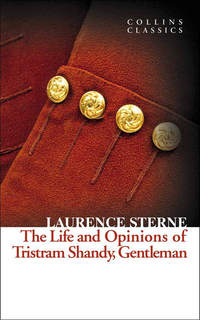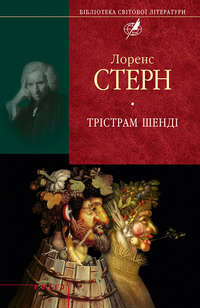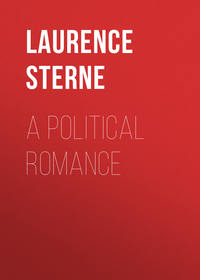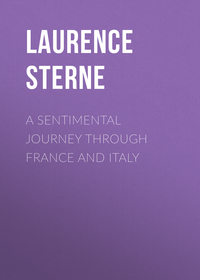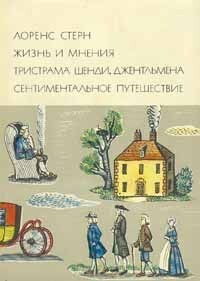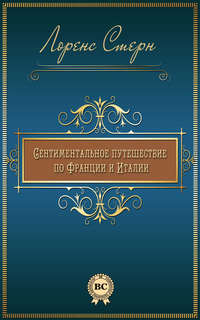
Полная версия
Tristram Shandy
A man and his Hobby-Horse, tho’ I cannot say that they act and re-act exactly after the same manner in which the soul and body do upon each other: Yet doubtless there is a communication between them of some kind; and my opinion rather is, that there is something in it more of the manner of electrified bodies,—and that, by means of the heated parts of the rider, which come immediately into contact with the back of the Hobby-Horse,—by long journies and much friction, it so happens, that the body of the rider is at length fill’d as full of Hobby-Horsical matter as it can hold;—so that if you are able to give but a clear description of the nature of the one, you may form a pretty exact notion of the genius and character of the other.
Now the Hobby-Horse which my uncle Toby always rode upon, was in my opinion an Hobby-Horse well worth giving a description of, if it was only upon the score of his great singularity;—for you might have travelled from York to Dover,—from Dover to Penzance in Cornwall, and from Penzance to York back again, and not have seen such another upon the road; or if you had seen such a one, whatever haste you had been in, you must infallibly have stopp’d to have taken a view of him. Indeed, the gait and figure of him was so strange, and so utterly unlike was he, from his head to his tail, to any one of the whole species, that it was now and then made a matter of dispute,—whether he was really a Hobby-Horse or no: But as the Philosopher would use no other argument to the Sceptic, who disputed with him against the reality of motion, save that of rising up upon his legs, and walking across the room;—so would my uncle Toby use no other argument to prove his Hobby-Horse was a Hobby-Horse indeed, but by getting upon his back and riding him about;—leaving the world, after that, to determine the point as it thought fit.
In good truth, my uncle Toby mounted him with so much pleasure, and he carried my uncle Toby so well,—that he troubled his head very little with what the world either said or thought about it.
It is now high time, however, that I give you a description of him:—But to go on regularly, I only beg you will give me leave to acquaint you first, how my uncle Toby came by him.
Chapter Twenty-five
The wound in my uncle Toby’s groin, which he received at the siege of Namur, rendering him unfit for the service, it was thought expedient he should return to England, in order, if possible, to be set to rights.
He was four years totally confined,—part of it to his bed, and all of it to his room: and in the course of his cure, which was all that time in hand, suffer’d unspeakable miseries,—owing to a succession of exfoliations from the os pubis, and the outward edge of that part of the coxendix called the os illium,—both which bones were dismally crush’d, as much by the irregularity of the stone, which I told you was broke off the parapet,—as by its size,—(tho’ it was pretty large) which inclined the surgeon all along to think, that the great injury which it had done my uncle Toby’s groin, was more owing to the gravity of the stone itself, than to the projectile force of it,—which he would often tell him was a great happiness.
My father at that time was just beginning business in London, and had taken a house;—and as the truest friendship and cordiality subsisted between the two brothers,—and that my father thought my uncle Toby could no where be so well nursed and taken care of as in his own house,—he assign’d him the very best apartment in it.—And what was a much more sincere mark of his affection still, he would never suffer a friend or an acquaintance to step into the house on any occasion, but he would take him by the hand, and lead him up stairs to see his brother Toby, and chat an hour by his bed-side.
The history of a soldier’s wound beguiles the pain of it;—my uncle’s visitors at least thought so, and in their daily calls upon him, from the courtesy arising out of that belief, they would frequently turn the discourse to that subject,—and from that subject the discourse would generally roll on to the siege itself.
These conversations were infinitely kind; and my uncle Toby received great relief from them, and would have received much more, but that they brought him into some unforeseen perplexities, which, for three months together, retarded his cure greatly; and if he had not hit upon an expedient to extricate himself out of them, I verily believe they would have laid him in his grave.
What these perplexities of my uncle Toby were,—’tis impossible for you to guess;—if you could,—I should blush; not as a relation,—not as a man,—nor even as a woman,—but I should blush as an author; inasmuch as I set no small store by myself upon this very account, that my reader has never yet been able to guess at any thing. And in this, Sir, I am of so nice and singular a humour, that if I thought you was able to form the least judgment or probable conjecture to yourself, of what was to come in the next page,—I would tear it out of my book.
Chapter One
I have begun a new book, on purpose that I might have room enough to explain the nature of the perplexities in which my uncle Toby was involved, from the many discourses and interrogations about the siege of Namur, where he received his wound.
I must remind the reader, in case he has read the history of King William’s wars,—but if he has not,—I then inform him, that one of the most memorable attacks in that siege, was that which was made by the English and Dutch upon the point of the advanced counterscarp, between the gate of St. Nicolas, which inclosed the great sluice or water-stop, where the English were terribly exposed to the shot of the counter-guard and demi-bastion of St. Roch: The issue of which hot dispute, in three words, was this; That the Dutch lodged themselves upon the counter-guard,—and that the English made themselves masters of the covered-way before St. Nicolas-gate, notwithstanding the gallantry of the French officers, who exposed themselves upon the glacis sword in hand.
As this was the principal attack of which my uncle Toby was an eye-witness at Namur,—the army of the besiegers being cut off, by the confluence of the Maes and Sambre, from seeing much of each other’s operations,—my uncle Toby was generally more eloquent and particular in his account of it; and the many perplexities he was in, arose out of the almost insurmountable difficulties he found in telling his story intelligibly, and giving such clear ideas of the differences and distinctions between the scarp and counterscarp,—the glacis and covered-way,—the half-moon and ravelin,—as to make his company fully comprehend where and what he was about.
Writers themselves are too apt to confound these terms; so that you will the less wonder, if in his endeavours to explain them, and in opposition to many misconceptions, that my uncle Toby did oft-times puzzle his visitors, and sometimes himself too.
To speak the truth, unless the company my father led up stairs were tolerably clear-headed, or my uncle Toby was in one of his explanatory moods, ’twas a difficult thing, do what he could, to keep the discourse free from obscurity.
What rendered the account of this affair the more intricate to my uncle Toby, was this,—that in the attack of the counterscarp, before the gate of St. Nicolas, extending itself from the bank of the Maes, quite up to the great water-stop,—the ground was cut and cross cut with such a multitude of dykes, drains, rivulets, and sluices, on all sides,—and he would get so sadly bewildered, and set fast amongst them, that frequently he could neither get backwards or forwards to save his life; and was oft-times obliged to give up the attack upon that very account only.
These perplexing rebuffs gave my uncle Toby Shandy more perturbations than you would imagine; and as my father’s kindness to him was continually dragging up fresh friends and fresh enquirers,—he had but a very uneasy task of it.
No doubt my uncle Toby had great command of himself,—and could guard appearances, I believe, as well as most men;—yet any one may imagine, that when he could not retreat out of the ravelin without getting into the half-moon, or get out of the covered-way without falling down the counterscarp, nor cross the dyke without danger of slipping into the ditch, but that he must have fretted and fumed inwardly:—He did so;—and the little and hourly vexations, which may seem trifling and of no account to the man who has not read Hippocrates, yet, whoever has read Hippocrates, or Dr. James Mackenzie, and has considered well the effects which the passions and affections of the mind have upon the digestion—(Why not of a wound as well as of a dinner?)—may easily conceive what sharp paroxysms and exacerbations of his wound my uncle Toby must have undergone upon that score only.
—My uncle Toby could not philosophize upon it;—’twas enough he felt it was so,—and having sustained the pain and sorrows of it for three months together, he was resolved some way or other to extricate himself.
He was one morning lying upon his back in his bed, the anguish and nature of the wound upon his groin suffering him to lie in no other position, when a thought came into his head, that if he could purchase such a thing, and have it pasted down upon a board, as a large map of the fortification of the town and citadel of Namur, with its environs, it might be a means of giving him ease.—I take notice of his desire to have the environs along with the town and citadel, for this reason,—because my uncle Toby’s wound was got in one of the traverses, about thirty toises from the returning angle of the trench, opposite to the salient angle of the demi-bastion of St. Roch:—so that he was pretty confident he could stick a pin upon the identical spot of ground where he was standing on when the stone struck him.
All this succeeded to his wishes, and not only freed him from a world of sad explanations, but, in the end, it proved the happy means, as you will read, of procuring my uncle Toby his Hobby-Horse.
Chapter Two
There is nothing so foolish, when you are at the expence of making an entertainment of this kind, as to order things so badly, as to let your criticks and gentry of refined taste run it down: Nor is there any thing so likely to make them do it, as that of leaving them out of the party, or, what is full as offensive, of bestowing your attention upon the rest of your guests in so particular a way, as if there was no such thing as a critick (by occupation) at table.
—I guard against both; for, in the first place, I have left half a dozen places purposely open for them;—and in the next place, I pay them all court.—Gentlemen, I kiss your hands, I protest no company could give me half the pleasure,—by my soul I am glad to see you—I beg only you will make no strangers of yourselves, but sit down without any ceremony, and fall on heartily.
I said I had left six places, and I was upon the point of carrying my complaisance so far, as to have left a seventh open for them,—and in this very spot I stand on; but being told by a Critick (tho’ not by occupation,—but by nature) that I had acquitted myself well enough, I shall fill it up directly, hoping, in the mean time, that I shall be able to make a great deal of more room next year.
—How, in the name of wonder! could your uncle Toby, who, it seems, was a military man, and whom you have represented as no fool,—be at the same time such a confused, pudding-headed, muddle-headed, fellow, as—Go look.
So, Sir Critick, I could have replied; but I scorn it.—’Tis language unurbane,—and only befitting the man who cannot give clear and satisfactory accounts of things, or dive deep enough into the first causes of human ignorance and confusion. It is moreover the reply valiant—and therefore I reject it; for tho’ it might have suited my uncle Toby’s character as a soldier excellently well,—and had he not accustomed himself, in such attacks, to whistle the Lillabullero, as he wanted no courage, ’tis the very answer he would have given; yet it would by no means have done for me. You see as plain as can be, that I write as a man of erudition;—that even my similies, my allusions, my illustrations, my metaphors, are erudite,—and that I must sustain my character properly, and contrast it properly too,—else what would become of me? Why, Sir, I should be undone;—at this very moment that I am going here to fill up one place against a critick,—I should have made an opening for a couple.
—Therefore I answer thus:
Pray, Sir, in all the reading which you have ever read, did you ever read such a book as Locke’s Essay upon the Human Understanding?—Don’t answer me rashly—because many, I know, quote the book, who have not read it—and many have read it who understand it not:—If either of these is your case, as I write to instruct, I will tell you in three words what the book is.—It is a history.—A history! of who? what? where? when? Don’t hurry yourself—It is a history-book, Sir, (which may possibly recommend it to the world) of what passes in a man’s own mind; and if you will say so much of the book, and no more, believe me, you will cut no contemptible figure in a metaphysick circle.
But this by the way.
Now if you will venture to go along with me, and look down into the bottom of this matter, it will be found that the cause of obscurity and confusion, in the mind of a man, is threefold.
Dull organs, dear Sir, in the first place. Secondly, slight and transient impressions made by the objects, when the said organs are not dull. And thirdly, a memory like unto a sieve, not able to retain what it has received.—Call down Dolly your chamber-maid, and I will give you my cap and bell along with it, if I make not this matter so plain that Dolly herself should understand it as well as Malbranch.—When Dolly has indited her epistle to Robin, and has thrust her arm into the bottom of her pocket hanging by her right side;—take that opportunity to recollect that the organs and faculties of perception can, by nothing in this world, be so aptly typified and explained as by that one thing which Dolly’s hand is in search of.—Your organs are not so dull that I should inform you—’tis an inch, Sir, of red seal-wax.
When this is melted and dropped upon the letter, if Dolly fumbles too long for her thimble, till the wax is over hardened, it will not receive the mark of her thimble from the usual impulse which was wont to imprint it. Very well. If Dolly’s wax, for want of better, is bees-wax, or of a temper too soft,—tho’ it may receive,—it will not hold the impression, how hard soever Dolly thrusts against it; and last of all, supposing the wax good, and eke the thimble, but applied thereto in careless haste, as her Mistress rings the bell;—in any one of these three cases the print left by the thimble will be as unlike the prototype as a brass-jack.
Now you must understand that not one of these was the true cause of the confusion in my uncle Toby’s discourse; and it is for that very reason I enlarge upon them so long, after the manner of great physiologists—to shew the world, what it did not arise from.
What it did arise from, I have hinted above, and a fertile source of obscurity it is,—and ever will be,—and that is the unsteady uses of words, which have perplexed the clearest and most exalted understandings.
It is ten to one (at Arthur’s) whether you have ever read the literary histories of past ages;—if you have, what terrible battles, yclept logomachies, have they occasioned and perpetuated with so much gall and ink-shed,—that a good-natured man cannot read the accounts of them without tears in his eyes.
Gentle critick! when thou hast weighed all this, and considered within thyself how much of thy own knowledge, discourse, and conversation has been pestered and disordered, at one time or other, by this, and this only:—What a pudder and racket in Councils about (Greek); and in the Schools of the learned about power and about spirit;—about essences, and about quintessences;—about substances, and about space.—What confusion in greater Theatres from words of little meaning, and as indeterminate a sense! when thou considerest this, thou wilt not wonder at my uncle Toby’s perplexities,—thou wilt drop a tear of pity upon his scarp and his counterscarp;—his glacis and his covered way;—his ravelin and his half-moon: ’Twas not by ideas,—by Heaven; his life was put in jeopardy by words.
Chapter Three
When my uncle Toby got his map of Namur to his mind, he began immediately to apply himself, and with the utmost diligence, to the study of it; for nothing being of more importance to him than his recovery, and his recovery depending, as you have read, upon the passions and affections of his mind, it behoved him to take the nicest care to make himself so far master of his subject, as to be able to talk upon it without emotion.
In a fortnight’s close and painful application, which, by the bye, did my uncle Toby’s wound, upon his groin, no good,—he was enabled, by the help of some marginal documents at the feet of the elephant, together with Gobesius’s military architecture and pyroballogy, translated from the Flemish, to form his discourse with passable perspicuity; and before he was two full months gone,—he was right eloquent upon it, and could make not only the attack of the advanced counterscarp with great order;—but having, by that time, gone much deeper into the art, than what his first motive made necessary, my uncle Toby was able to cross the Maes and Sambre; make diversions as far as Vauban’s line, the abbey of Salsines, &c. and give his visitors as distinct a history of each of their attacks, as of that of the gate of St. Nicolas, where he had the honour to receive his wound.
But desire of knowledge, like the thirst of riches, increases ever with the acquisition of it. The more my uncle Toby pored over his map, the more he took a liking to it!—by the same process and electrical assimilation, as I told you, through which I ween the souls of connoisseurs themselves, by long friction and incumbition, have the happiness, at length, to get all be-virtu’d—be-pictured,—be-butterflied, and be-fiddled.
The more my uncle Toby drank of this sweet fountain of science, the greater was the heat and impatience of his thirst, so that before the first year of his confinement had well gone round, there was scarce a fortified town in Italy or Flanders, of which, by one means or other, he had not procured a plan, reading over as he got them, and carefully collating therewith the histories of their sieges, their demolitions, their improvements, and new works, all which he would read with that intense application and delight, that he would forget himself, his wound, his confinement, his dinner.
In the second year my uncle Toby purchased Ramelli and Cataneo, translated from the Italian;—likewise Stevinus, Moralis, the Chevalier de Ville, Lorini, Cochorn, Sheeter, the Count de Pagan, the Marshal Vauban, Mons. Blondel, with almost as many more books of military architecture, as Don Quixote was found to have of chivalry, when the curate and barber invaded his library.
Towards the beginning of the third year, which was in August, ninety-nine, my uncle Toby found it necessary to understand a little of projectiles:—and having judged it best to draw his knowledge from the fountain-head, he began with N. Tartaglia, who it seems was the first man who detected the imposition of a cannon-ball’s doing all that mischief under the notion of a right line—This N. Tartaglia proved to my uncle Toby to be an impossible thing.
—Endless is the search of Truth.
No sooner was my uncle Toby satisfied which road the cannon-ball did not go, but he was insensibly led on, and resolved in his mind to enquire and find out which road the ball did go: For which purpose he was obliged to set off afresh with old Maltus, and studied him devoutly.—He proceeded next to Galileo and Torricellius, wherein, by certain Geometrical rules, infallibly laid down, he found the precise path to be a Parabola—or else an Hyperbola,—and that the parameter, or latus rectum, of the conic section of the said path, was to the quantity and amplitude in a direct ratio, as the whole line to the sine of double the angle of incidence, formed by the breech upon an horizontal plane;—and that the semi-parameter,—stop! my dear uncle Toby—stop!—go not one foot farther into this thorny and bewildered track,—intricate are the steps! intricate are the mazes of this labyrinth! intricate are the troubles which the pursuit of this bewitching phantom Knowledge will bring upon thee.—O my uncle;—fly—fly,—fly from it as from a serpent.—Is it fit—goodnatured man! thou should’st sit up, with the wound upon thy groin, whole nights baking thy blood with hectic watchings?—Alas! ’twill exasperate thy symptoms,—check thy perspirations—evaporate thy spirits—waste thy animal strength, dry up thy radical moisture, bring thee into a costive habit of body,—impair thy health,—and hasten all the infirmities of thy old age.—O my uncle! my uncle Toby.
Chapter Four
I would not give a groat for that man’s knowledge in pen-craft, who does not understand this,—That the best plain narrative in the world, tacked very close to the last spirited apostrophe to my uncle Toby—would have felt both cold and vapid upon the reader’s palate;—therefore I forthwith put an end to the chapter, though I was in the middle of my story.
—Writers of my stamp have one principle in common with painters. Where an exact copying makes our pictures less striking, we choose the less evil; deeming it even more pardonable to trespass against truth, than beauty. This is to be understood cum grano salis; but be it as it will,—as the parallel is made more for the sake of letting the apostrophe cool, than any thing else,—’tis not very material whether upon any other score the reader approves of it or not.
In the latter end of the third year, my uncle Toby perceiving that the parameter and semi-parameter of the conic section angered his wound, he left off the study of projectiles in a kind of a huff, and betook himself to the practical part of fortification only; the pleasure of which, like a spring held back, returned upon him with redoubled force.
It was in this year that my uncle began to break in upon the daily regularity of a clean shirt,—to dismiss his barber unshaven,—and to allow his surgeon scarce time sufficient to dress his wound, concerning himself so little about it, as not to ask him once in seven times dressing, how it went on: when, lo!—all of a sudden, for the change was quick as lightning, he began to sigh heavily for his recovery,—complained to my father, grew impatient with the surgeon:—and one morning, as he heard his foot coming up stairs, he shut up his books, and thrust aside his instruments, in order to expostulate with him upon the protraction of the cure, which, he told him, might surely have been accomplished at least by that time:—He dwelt long upon the miseries he had undergone, and the sorrows of his four years melancholy imprisonment;—adding, that had it not been for the kind looks and fraternal chearings of the best of brothers,—he had long since sunk under his misfortunes.—My father was by. My uncle Toby’s eloquence brought tears into his eyes;—’twas unexpected:—My uncle Toby, by nature was not eloquent;—it had the greater effect:—The surgeon was confounded;—not that there wanted grounds for such, or greater marks of impatience,—but ’twas unexpected too; in the four years he had attended him, he had never seen any thing like it in my uncle Toby’s carriage; he had never once dropped one fretful or discontented word;—he had been all patience,—all submission.
—We lose the right of complaining sometimes by forbearing it;—but we often treble the force:—The surgeon was astonished; but much more so, when he heard my uncle Toby go on, and peremptorily insist upon his healing up the wound directly,—or sending for Monsieur Ronjat, the king’s serjeant-surgeon, to do it for him.
The desire of life and health is implanted in man’s nature;—the love of liberty and enlargement is a sister-passion to it: These my uncle Toby had in common with his species—and either of them had been sufficient to account for his earnest desire to get well and out of doors;—but I have told you before, that nothing wrought with our family after the common way;—and from the time and manner in which this eager desire shewed itself in the present case, the penetrating reader will suspect there was some other cause or crotchet for it in my uncle Toby’s head:—There was so, and ’tis the subject of the next chapter to set forth what that cause and crotchet was. I own, when that’s done, ’twill be time to return back to the parlour fire-side, where we left my uncle Toby in the middle of his sentence.


